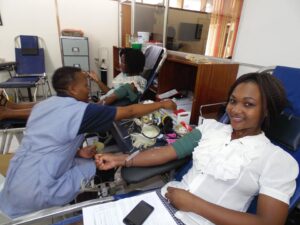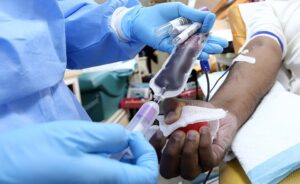CLAIM: Menstruating at seven years has become common owing to the type of food being consumed today.
SOURCE: The Chronicle
VERDICT: Inconclusive
A grim tale
In the last couple of months, two grim stories have come out in the media of two minor girls who were pregnant at 9 and 8 years old, here and here.
Since the two minor children cannot consent to sex, it was a clear case of rape and sexual assault.
In the two incidents, according to the mothers, the girls had started menstruating at two months and and the other at seven years.
In one of the stories, the mother is quoted as saying that her daughter started menstruating at seven years old and she took her to the local clinic.
It was at this clinic that she says she was told that, “it was common owing to the type of food being consumed today”.
Precocious Puberty
In an article on ‘The age of menarche’, it is stated that average age at menarche, which refers to the age at onset of menstruation, in 1840 was 16.5 years, now it is 13.
Jill de Jong, MD, PhD, and Shashwati Pradhan, MD in an article “Getting your period: What is a ‘normal’ menstrual cycle for teens and preteens?”, published in March 2022, say that adolescents usually get their first period between the ages of 10 and 15, but it can occur earlier or later. Twelve is considered an “average” age for menarche — the start of the menstrual cycle.
Another study conducted between 2013 and 2017 showed that the percentage of women who reached menarche by age 10 rose from 7% to 10%, during that period.
The traditional definition of precocious puberty is the development of secondary sexual characteristics before 8 years of age in girls and 9 years in boys.
This refers to a sequence of events occuring during which a child develops into a young adult beginning at an unexpectedly early age. Glands that secrete growth and sex hormones begin to function abnormally early in life resulting in this condition.
In the case of the 8 year old Zimbabwean girl, her mother is quoted as saying she started her menses at 9 months.
One of the earliest records of precocious puberty recorded is of a 6 month old girl.
The heartbreaking case of Lina Medina
Lina Medina lived in Ticrapo, Peru. In April 1939, her parents brought her to the Hospital of Pisco and expressed concerns that a large tumor was growing in her abdomen.
After evaluating Medina, doctors determined that the child was actually about seven months pregnant. The identity of the child’s rapist couldn’t be confirmed, in part, because the 5-year-old “couldn’t give precise responses” to questions about the event, physician-researcher Edmundo Escomel wrote in the May 1939 issue of the French journal La Presse Médicale.
She is the youngest mother ever recorded, as verified by fact checking organisation, Snopes.
Apart from the Zimbabwean girls, in the past two years alone, a 10 year old American girl had to have an abortion after she was raped, this year, and an 11 year old girl became what could be the youngest mother in the United Kingdom, in 2021.
Is it all in the food?
So, what causes precocious puberty?
A study on nutrition and pubertal development suggests that nutrition is one of the most important factors on how early one reaches puberty.
The study says, “Excessive eating of many processed, high-fat foods, may be the cause of this phenomenon. Overweight or obese children are more likely to enter puberty early. Some evidence suggests that obesity can accelerate the onset of puberty in girls and may delay the onset of puberty in boys.”
It continues to assert that nutritional status during childhood has a significant effect on pubertal development and can explain as much as 25% of the variation in the timing of puberty.
Another study also suggests that diet quality affects the age of menstruation. It attests that a higher animal protein intake, particularly at age 5–6 years, was associated with an earlier menarche/voice break independent of prepubertal body composition and that, conversely, a higher vegetable protein intake at 3–4 and 4–5 years might delay pubertal development.
However, other studies show that it is not as simple as what one puts on their child’s plate. This study says that puberty is becoming increasingly common owing to a multitude of factors such as genetics, lifestyle changes, and exposure to endocrine- disrupting chemicals.
An article from National Organization for Rare Diseases says research is beginning to identify rare genetic causes for some of these cases of precocious puberty.
It says some types of precocious puberty can be caused by tumors and other disorders including: encephalitis, brain abscess, static encephalopathy, global delays, or head trauma, among others.
In line with this, Snopes wrote that in a report published in December 1939 in La Presse Medicale, the doctor looking at Lina Medina’s case file, theorized that the child started puberty extraordinary early due to some disorder of the pituitary gland — a bean-shaped gland at the base of the brain that directs the body’s production of sex hormones.
Of importance is to note that ovulation in girls actually starts before menstruation and, therefore, girls can become pregnant before ever having a period.
Dr. Kimberly Gecsi, an OB/GYN at UH Case Medical Center in Cleveland, quoted by ABCNews on a story of a 10 year old Colombian girl giving birth in 2012, says that a growth spurt, developing breasts and pubic hair, are signs that menstruation is about to start.
It might be the diet, but there are other factors at play
In conclusion, the claim that menstruating at seven years has become common owing to the type of food being consumed today, has been rated as inconclusive. All the studies quoted here, suggest that there is need for more research to be carried out on the causes of precocious puberty. Therefore, the claim is rated as inconclusive.










